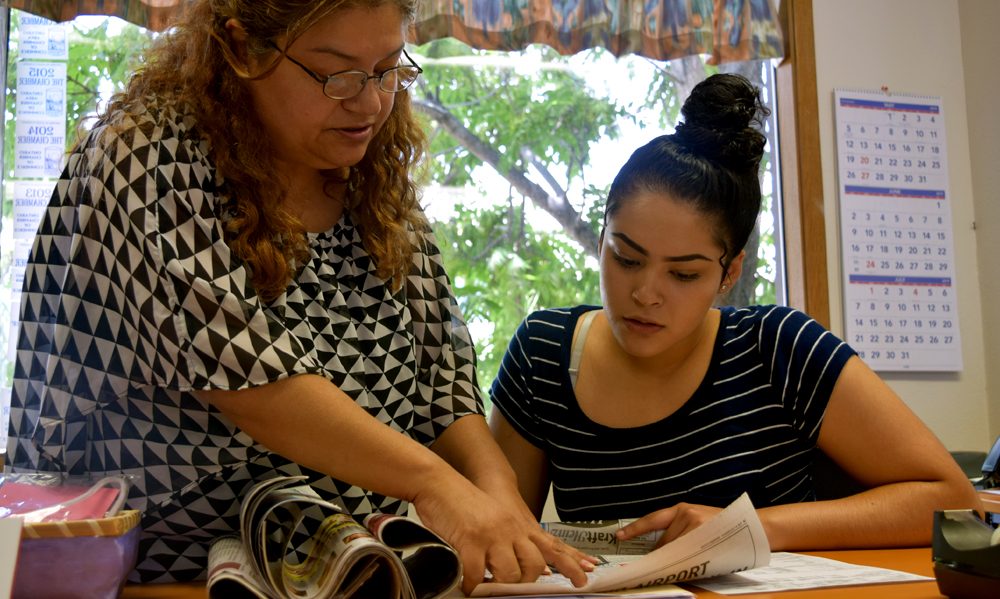 Jeaneth Mendoza, workforce consultant at the Oregon Human Development Corp., shows the ropes to Jasmine Romero. (The Enterprise/Yadira Lopez).
Jeaneth Mendoza, workforce consultant at the Oregon Human Development Corp., shows the ropes to Jasmine Romero. (The Enterprise/Yadira Lopez).
ONTARIO – The phone rings and Jasmine Romero is quick to answer.
When she takes a call, she glances at her supervisor, Jeaneth Mendoza, to make sure her words are correct.
It’s the first day of work for Romero.
The 18-year-old is an administrative assistant at the Oregon Human Development Corp. Her work experience is funded through the National Farmworker Jobs Program.
Using U.S. Department of Labor grants, the program, dating back to 1979, helps farmworkers and their families move out of agriculture and into different and often better-paying jobs.
“We don’t want to take employees away from farmers,” said Mendoza, workforce consultant at the Ontario office of the development corporation, a nonprofit that helps farmworkers. “But if someone comes in and tells us they no longer want to work in the fields, we can help them.”
The aim is to reach between 55 and 60 clients each year. Through the grant’s job training portion, the organization places applicants with local employers and reimburses up to 50% of the wages earned by the employee for the first two weeks.
Oregon Human Development also offers work experience by placing trainees with local employers, such as nursing facilities and schools, to be trained while the nonprofit pays the wage.
To be eligible, applicants must be authorized to work in the U.S. They must be low income and either be farmworkers or be a dependent of someone who has worked in agriculture 12 months out of the last two years.
That was Romero’s story. Her mom works in an onion packing shed and her dad tends fields in Fruitland. They both wanted something different for their daughter.
College didn’t quite feel like the right choice for now. Too expensive, said Romero. But all her friends were planning on going straight to college when she graduated from Ontario High School in the spring.
Romero struggled. She didn’t want to continue working in fast food.
She knew she liked computers and paperwork, and that staying organized was almost a hobby of hers. She contacted Mendoza, who helped steer her toward administrative assistant jobs.
“It opened my eyes,” Romero said of the program. “I’m not stressed anymore.”
Mendoza is part social worker, part college counselor. On any given day she’ll juggle calls about the Oregon Human Development’s rental assistance program, the jobs program and any other question that comes her way.
When a student walked in last week, Mendoza calmly talked her through various options. She encouraged her to look for internships and get in touch with a professor about a bad grade.
Through the years, Oregon Human Development has helped clients who want to leave agriculture altogether, but they have also worked with farmworkers who want to stay in that sector but are looking for promotions to better paying jobs.
“When that light goes on, not only when they figure out what they want to do but when they realize they can do it, that’s when you see the confidence kick in,” said Mendoza.
Now Mendoza is seeing clients, most of them younger, come in with other goals. They apply to the program’s youth portion, which kicked off last year and helps with securing work experience and also provides some scholarships for school. Some want to become welders or go into teaching. Others dream of working as athletic trainers.
At Oregon Human Development they get guidance and financial help.
In a conference room at the nonprofit, Romero points to photographs that decorate a bulletin board. They are pictures of others before her who completed the program. She points to one picture and recognizes a woman she knows who used to work at a gas station. In the photo, the woman is training as a certified nursing assistant.
Romero scans the photos of success stories.
In a few months, she hopes, her picture will be there too.
Reporter Yadira Lopez: 541-473-3377 or [email protected].
SUBSCRIBE TO HELP PRODUCE VITAL REPORTING — For $5 a month, you get breaking news alerts, emailed newsletters and around-the-clock access to our stories. We depend on subscribers to pay for in-depth, accurate news produced by a professional and highly trained staff. Help us grow and get better with your subscription. Sign up HERE.




